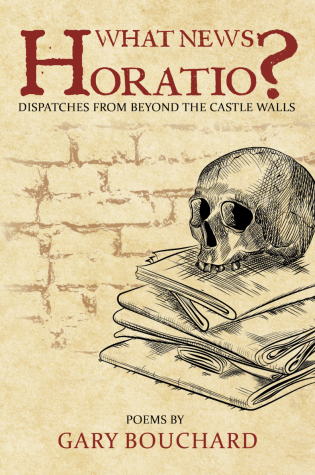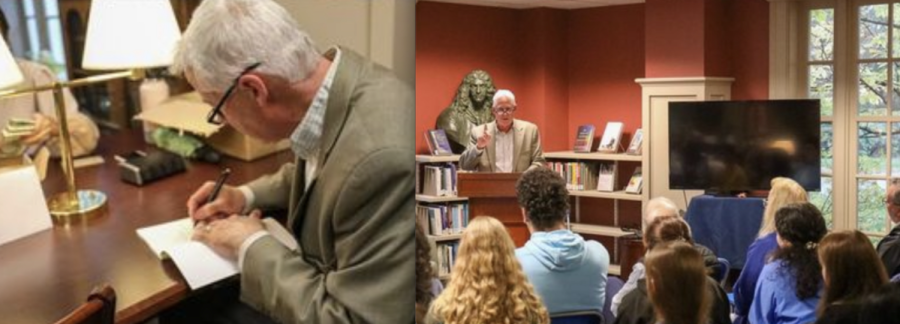New poetry collection on ‘absurdity and everyday life’
Prof. Bouchard held a reading and book signing in Geisel Library on Oct. 15.
November 3, 2022
Professor Gary Bouchard of the Saint Anselm English department has released a new book of poetry entitled, What News Horatio? Dispatches from Beyond the Castle Walls. The slim volume includes a variety of original and often humorous poems inspired by the commonplace absurdities of news headlines.
Bouchard recalls, “Back in 2014, I was struck by a headline about a parrot returning to its owner after being missing for several years. That’s pretty much how it started. After that, these sorts of headlines would catch my attention every day or every other day.” Some of the bizarre headlines found within the book include, “Remorseful Bank Robber Waits for Police after Heist,” and “Soccer Player Dies After Fatal Goal Celebration.”
However, Bouchard does not simply want his reader to be entertained by the absurdity of these headlines. He notes, “There’s always a feeling when you read an article like that in the newspaper that you just can’t make this stuff up! Our initial reaction to it is, ‘that’s so funny,’ but when you read the article, you realize that there’s a life behind it.” All of the poems should give the reader a pause for thought.
After his initial poetic reflection on the prodigal parrot, Professor Bouchard slowly began to form a corpus in the following years. He recalled, “I’ve written poetry before, but it’s not something I do all the time. Obviously, I teach poetry every year in one form or another, so I think a lot of the ideas were picked up subconsciously.” The two constants became news headlines and a little bit of Shakespeare. “Early on,” he says, “Hamlet leaked into the first few poems.”
After that, he decided to develop his work with these two guidelines. The poems are all different; some prose poems, some free verse, some in Shakespearean iambic pentameter. All are reflections based on headlines with “a sprinkle,” or more, but always, “a little Hamlet in every poem.”
The title of the book, What News, Horatio, is, of course, a reference to Shakespeare’s famous work. Bouchard explains, “Hamlet never says, ‘what news, Horatio?’ He just says to Horatio, ‘what news’”–a little poetic license. The section headings are taken directly from the play. These include memorable excerpts such as, “Quintessence of Dust,” “Fortune’s Finger,” and “Guilty Creatures.”
Regarding the place of Hamlet in the collection, Bouchard says, “The best metaphor I’ve come up with is as if I were building a mosaic, and I just took Hamlet and chopped it up into little pieces so there are shards and bits and pieces of Hamlet throughout the whole thing. Some poems have two words. Some poems have several lines.”
Absurdity and everyday life are the common thematic elements that join the various poems together. Professor Bouchard notes, “The cliche articulation of that commonality is this: the fact that these headlines exist and that they are in the newspaper certainly suggests that truth is stranger than fiction. The everyday absurdities of life do in fact happen.” Referencing a title within, he adds, “There’s going to be somebody out there who tries to eat their own DWI.”
However, Bouchard wants “hope” to be the message readers take from the book. He explains, “It was important to me that in some way the book moves us towards the idea of redemption and grace rather than despair, nihilism, or just throwing your hands up in the air. The final image of the book is from the prodigal son. It is very deliberate and very important to me that the book ends with the road towards grace.”
The final poem is entitled “Scientists Discover Planet like Earth.” Referencing the biblical story of Cain and Abel, thought to be the first act of senseless violence, Bouchard writes: “No, unless they have found samples of blood/and hair on stone and silence surrounding/the whole wretched affair,/Then they have discovered no planet like ours,/No crimes to match a measure’s worth/of the indifferent children of the earth.
“What is the theme of the book?” Bouchard asks. “I’d say it is the same as the theme of Hamlet, which is the same as the theme of our lives. It’s sin and grace and all the madness in between.” Indeed, how else are we to understand a world that has produced headlines such as, “Bandit Jailed for Fifteen Years Robs Same Store Day After Release,” and “35,000 Pounds of Rotting Chicken Abandoned”?As Bouchard concludes his work, “This is where we dwell … Grace awaits on the long road home– and we are angels yet in this.”

poems. (Courtesy / Gary Bouchard)



